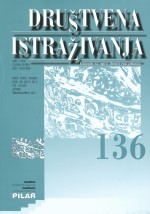Je li Županov imao pravo? Testiranje podrijetla i perzistencije egalitarnoga sindroma
Was Županov Right? Testing the Origin and Persistence of the Egalitarian Syndrome
Author(s): Vuk Vuković, Aleksandar Štulhofer, Ivan BurićSubject(s): Social development, Social Theory
Published by: Institut društvenih znanosti Ivo Pilar
Keywords: egalitarian syndrome; persistence; societal development; Županov;
Summary/Abstract: The egalitarian syndrome theory (Županov, 1970) is the most significant Croatian theory of societal development. As opposed to Županov’s interpretation according to which the egalitarian syndrome (ES) is defined by the legacy of the premodern agrarian culture which was further embedded under socialism, some critics of this theory believe that the values which form the ES are a reaction to the costs of the post- -socialist transition and the war for independence. In this paper, these two confronted explanations of the origin of the ES are empirically tested and arguments for the persistence of its specific set of values are questioned. The results of the multivariate regression analysis on the county level show that the share of agricultural population from the end of the 1960s and the beginning of the 1970s – and not the social costs of war and transition in the 1990s – is a significant predictor of the county level of ES at the beginning of 2016, thus confirming the hypothesis of its persistence. The results of this paper imply that the ES is an inherited set of values which still affects everyday life in Croatia today, thus aggravating its socioeconomic development.
Journal: Društvena istraživanja - Časopis za opća društvena pitanja
- Issue Year: 26/2017
- Issue No: 2
- Page Range: 207-225
- Page Count: 19
- Language: Croatian

